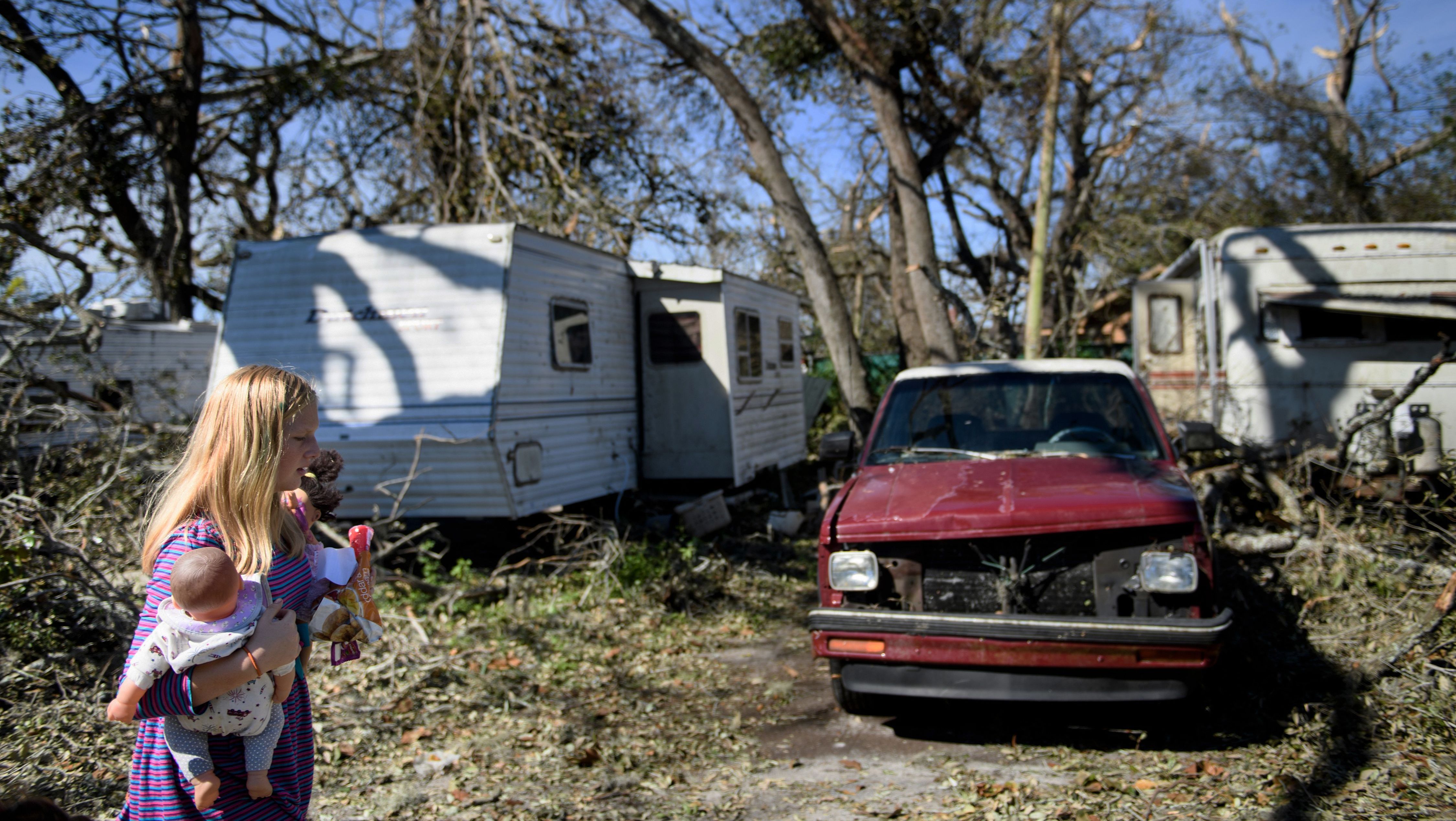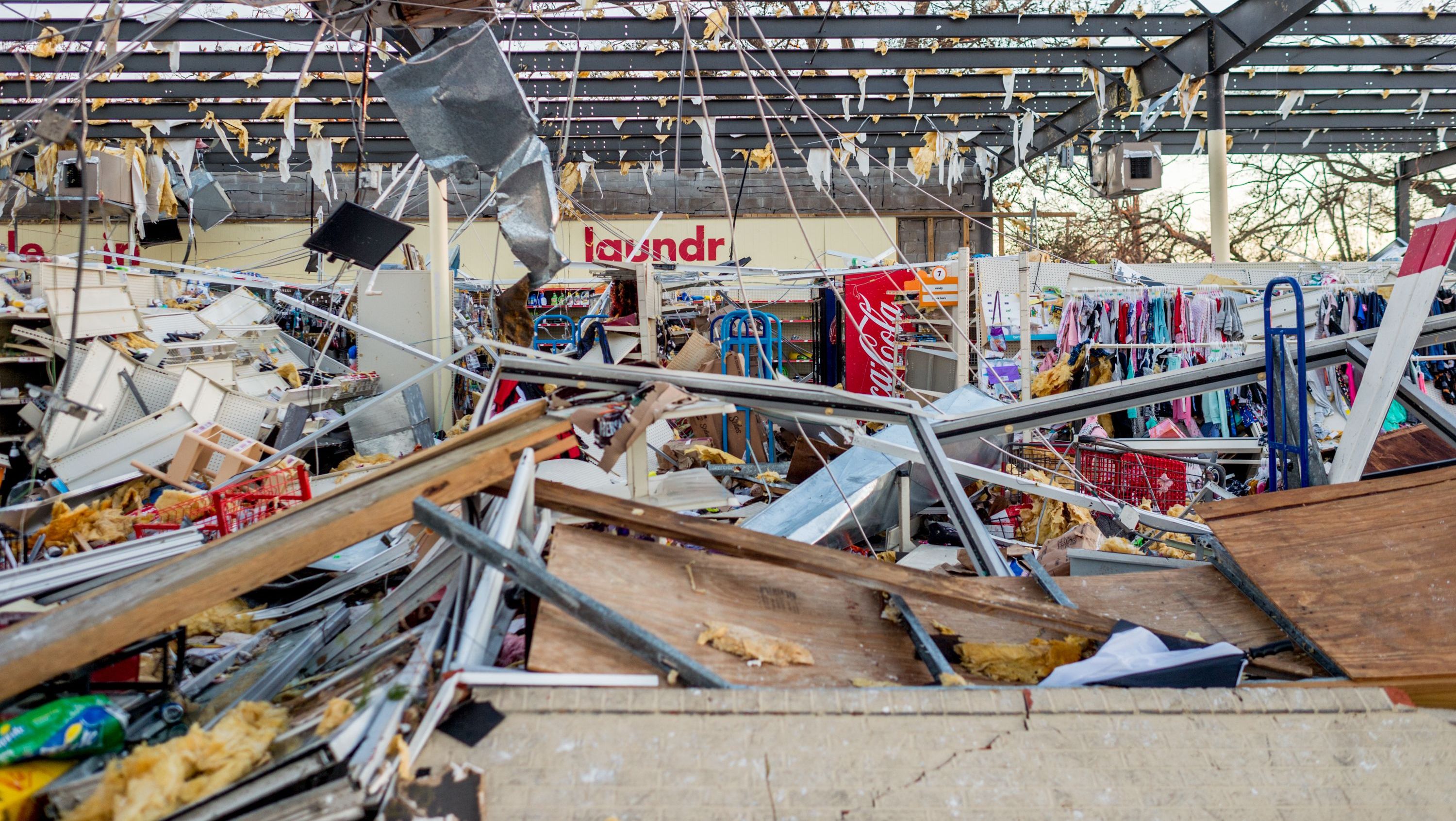How to Help Hurricane Michael Survivors and Victims
Recovery could take years, but you can help right now.

It seems like each year the number and respective force of hurricanes increases, and Hurricane Michael—which made landfall in the Florida panhandle last week as a Category 4, the third-most intense hurricane to hit the U.S. in nearly a century—was no exception. This isn't a coincidence: As man-made global warming worsens, the destruction left by major weather events will worsen alongside it. In fact, it’s gotten so bad that there’s a push to stop calling hurricanes “natural disasters,” since that term implies humans aren’t contributing to their severity (we very much are).
But we can also help relieve some of the emotional and physical strain that these hurricanes have caused. Hurricane Michael was particularly devastating: At least 18 people have died, and nearly 46 people are still unaccounted for, with experts warning that the property damage may take a year or more to clean up and restore.
As in other disasters, giving money is the best way to help out, since donations of clothes and food—especially at early stages of relief efforts—can actually do more harm than good as roads are being cleared. GlobalGiving, a nonprofit which crowdfunds disaster relief and distributes it to the organizations best equipped to handle various aspects of recovery, has a fund set up for Michael, which you can donate to here. As of publication, GlobalGiving has raised about $115,000 of their $2 million goal.

A little girl in front of her family’s ruined trailer min the aftermath of Hurricane Michael.
As Marlena Hartz, Content Manager for the Disaster Recovery Network at GlobalGiving, explained to MarieClaire.com, these are really three phases of recovery that your money can go to: Relief (“delivery of food, water, medicine, removal of debris, shelter for survivors,” explains Hartz), recovery (“rebuilding and reconstructing damaged homes, trauma therapy, return to stability”), and resilience (“business re-entry, reforestation, risk mitigation, strategic planning.”)
Some of the groups that GlobalGiving is working with for the initial phase of relief include International Medical Corps, which often acts as the first responder in many global disasters. There’s also the Fuel Relief Fund, which gets much-needed fuel to those in need—crucial, since Michael knocked out power for over 700,000 people in six affected states. Again, you can give to these organizations directly or just make a donation to GlobalGiving’s Hurricane Michael Relief Fund and have your contribution sent to various organizations as needed.

A Family Dollar’s storefront was ripped off in Hurricane Michael.
Locally, the Fund is working with North Carolina Veterans Hall of Fame. “This group of brave veterans is searching for survivors near fallen structures and clearing debris from impassable roadways in the Florida Panhandle and Georgia, to speed up the delivery of food, water, and other essential supplies,” says Hartz. You can donate directly to them through GG here.
For pets, the Humane Society of Broward County took in some animals from shelters affected by Hurricane Michael. If you want to give money to the shelter, you can donate at this link. Those pets also need forever homes, if you’re looking for a new friend. Plus, a group of volunteers from PAWS Chicago has gone down to Hurricane Michael sites to rescue pets abandoned by the storm, and you can donate to their organization here. Likewise, the Humane Society of Naples is sending a team to work with FEMA directly in order to rescue abandoned animals. You can donate to them here.
Get exclusive access to fashion and beauty trends, hot-off-the-press celebrity news, and more.
The Humane Society of the United States also has a more general fund, the Emergency Animal Rescue Fund, which you can donate to here. It provides financial support for transports of animals, which can take the burden off of shelters in affected areas, and helps move equipment, supplies, and personnel to disaster zones in order to help animals affected there.
Remember: Every little bit counts and it’s important to make sure that we help our neighbors return to normalcy as quickly as possible. After all, you or I may need the same from them one day.
We'll update as more information and resources become available.
Cady has been a writer and editor in Brooklyn for about 10 years. While her earlier career focused primarily on culture and music, her stories—both those she edited and those she wrote—over the last few years have tended to focus on environmentalism, reproductive rights, and feminist issues. She primarily contributes as a freelancer journalist on these subjects while pursuing her degrees. She held staff positions working in both print and online media, at Rolling Stone and Newsweek, and continued this work as a senior editor, first at Glamour until 2018, and then at Marie Claire magazine. She received her Master's in Environmental Conservation Education at New York University in 2021, and is now working toward her JF and Environmental Law Certificate at Elisabeth Haub School of Law in White Plains.